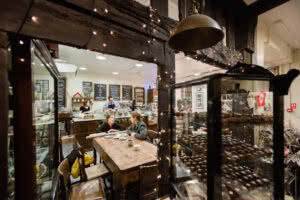Whatever pricing strategy you adopt for your event, your ticket price says so much more than just how much it costs to enter. So, when you’ve worked out your fixed event costs and estimated the variables, looked at margins, checked out the competition and had one or two lengthy team planning meetings, it’s time to give some consideration to what you want your ticket price to say about your event.
What should your headline price be?
Eventbrite research indicates that the most successful events have a variety of ticket types and price points, however, tying down your headline price has to be the first challenge. Ticket prices often need to be confirmed before event organisers have their programme content confirmed to justify the cost of admission. If it’s a launch event which is consequently unfamiliar to your target audience and you select a high price point, they may hold off from purchasing in case a better-valued ticket is offered for a similar event. If you price too low, consumers may consider the event not worthy of attending as the perceived value is not present. Either way, a ticketing strategy needs to be carefully considered.
Ticket offers
With the growth and consolidation of daily deals operators such as Groupon, Wowcher and LivingSocial over the past ten years, many event organisers have utilised this opportunity to reach huge audiences who may not be easily accessed through other channels. This has worked particularly well for events with mass appeal and high volumes of tickets such as big consumer exhibitions and those aimed at families. However, making tickets available through platforms like Groupon can have a negative effect on your event brand. If you’re working with a licensed brand or sponsors, this will need to be given additional consideration. Daily deal networks are often used as part of the launch campaign for an event then reigned back in once the event has gained some momentum.
A more subtle but effective way to lure audiences with reduced price tickets is to offer them to discreet audiences. Any organisation with a membership relevant to your target audience is a good place to start if they’re willing to work with you. Sometimes third parties are just happy with the opportunity to offer something extra to their members without it costing them anything. Other organisations may want something in return such as complimentary tickets, or free promotion to your audience. By working with relevant organisations that can reach new audiences, you benefit from a highly targeted campaign, with little impact on your brand in the wider marketplace.
If you’re planning to offer discounted tickets you need to go out with your best deal first. Offering an early bird discount is often a great way to kickstart a campaign. As well as banking some cash early on and getting your event on the radar, these customers can then become ambassadors and may be persuaded to trade up should additional product options become available to them.
Dwell times
As well as considering whether an event is worth going to or not, your target audience may be making judgements about how long they will spend at the event based on the ticket price. Is a £10 ticket worth an entire afternoon out and at what price point does it become worth a day trip?
Dwell time can depend on the size and programming of the event, the venue, it’s facilities and proximity to other leisure opportunities. For example, the NEC Birmingham heavily promotes the Resort World complex to event visitors. This is adjacent to the NEC and includes shops, restaurants, a casino and spa. Similarly, ExCeL London highlights its proximity to Canary Wharf and the delights of central London. If these additional elements are of interest to the target audience, the decision to attend your event can be positively influenced by promoting additional experiences as part of their visit.
Premium and added value tickets
If your event is aimed at a more affluent audience or you’re offering an enhanced visitor experience, a premium priced ticket can be introduced. Again, perceived value is key and needs to be considered in relation to the headline ticket price. In addition to event admission, the premium ticket may include reserved parking, fast track entry, gifts, seating, VIP toilets, hospitality, backstage access or proximity to talent. The availability of Premium tickets communicates to potential attendees that your event offers something that is differentiated and can improve their experience which can attract a new audience.
Event tickets can also be bundled with other products such as dining, or drinks and accommodation, building the event ticket into an experience for those who want more.
Ticket types for all attendees
Deciding whether to offer tickets for family groups and/or disabled visitors will be largely determined by the suitability of the event and venue for these groups. Most exhibition venues have good disability access now but vary on services available beyond that, such as catering for children. If your event is outside, be honest about the suitability for pushchairs and wheelchairs and the facilities provided. Whatever type of event you are planning, offering family tickets and tickets for disabled visitors (often with a free carer ticket) sets an expectation that these groups will be catered for sufficiently so you need to decide whether that is deliverable before the ticketing goes live. Not offering these ticket types does not mean these groups are not welcome, but expectations need to be managed in advance to avoid problems on site wherever possible.
Exhibitor presentation
With a consumer exhibition, much of the presentation of the event may be in the hands of your exhibitors, so this needs to be managed to ensure it’s in line with visitor expectations. For example, in the case of a fairly relaxed event with a ticket price of £10 or less, trestle tables and garden chairs may be acceptable stand furniture, but higher priced events will generally require a better standard of presentation. Red carpet might not be essential (unless it’s part of your brand) but a visitor experience appropriate to your audience and ticket price is paramount and good exhibitor presentation is central to that.
Audience and messaging
Whatever ticketing strategy you pursue, investing time in getting to know and understand your target audience is key. As well as assisting your decision-making re pricing, it will help to shape the nature and timing of your messaging with clear reasons why people should buy a ticket at a given price. The pricing itself should also be clearly communicated and not overly complicated to avoid unnecessary barriers to purchase.
Booking and administration fees should be clearly stated in your ticket price as to be completely transparent with your audience. These can either be included in the overall ticket price displayed, or shown as an additional cost, but must be addressed with clarity in mind.
To conclude
There is no exact science or magic answers for ticket pricing. Experience, competitor research, a good handle on costs, proper planning, plus some instinctual feelings are a good starting point. Using available pricing resources will also ensure you’re giving yourself the best chance at pricing your event competitively, where both you as the organiser and the attendees are experiencing real value as a result.





